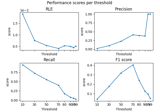mne.simulation.metrics.spatial_deviation_error#
- mne.simulation.metrics.spatial_deviation_error(stc_true, stc_est, src, threshold='50%', per_sample=True)[source]#
Compute the spatial deviation.
The spatial deviation characterizes the spread of the estimate source around the true source.
\[SD = \dfrac{\sum_i|s_i|\|r_{i} - r_{true}\|^2}{\sum_i|s_i|}.\]where \(r_{true}\) is a true dipole position, \(r_i\) and \(|s_i|\) denote respectively the position and amplitude of i-th dipole in source estimate.
Threshold is used on estimated source for focusing the metric to strong amplitudes and omitting the low-amplitude values.
- Parameters:
- stc_trueinstance of (Vol|Mixed)SourceEstimate
The source estimates containing correct values.
- stc_estinstance of (Vol|Mixed)SourceEstimate
The source estimates containing estimated values e.g. obtained with a source imaging method.
- srcinstance of
SourceSpaces The source space on which the source estimates are defined.
- threshold
float|str The threshold to apply to source estimates before computing the recall. If a string the threshold is a percentage and it should end with the percent character.
- per_samplebool
If True the metric is computed for each sample separately. If False, the metric is spatio-temporal.
- Returns:
Notes
These metrics are documented in [1] and [2].
New in v1.2.
References
